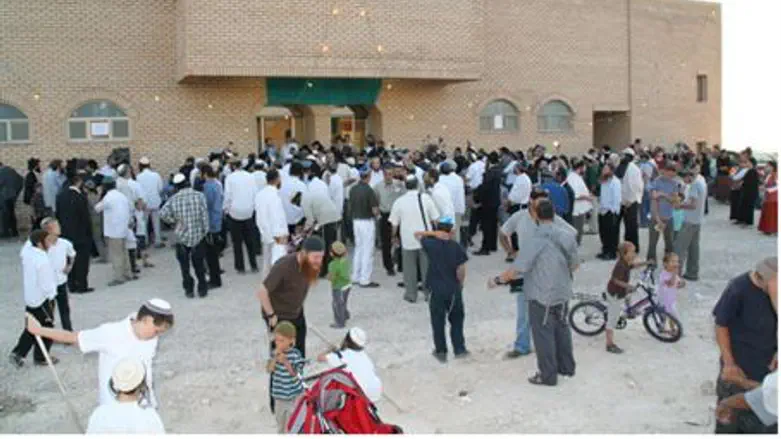
“Save Our Building” is the name of the last-ditch campaign launched by students and supporters of the Od Yosef Chai Yeshiva in Yitzhar.
July 4, 2010 marks the demolition date for the yeshiva, located in Samaria. According to a hotly contested order imposed by the IDF’s Civil Administration, the 11-year-old building in the town of Yitzhar is not properly authorized, despite amply documented government authorization and funding for its construction.
Yeshiva staff, students and supporters, shocked by the May 9th demolition order, have mobilized to prevent the destruction, which many claim to be due to a policy adopted to punish area residents and students for conflicts with the IDF and for alleged acts of retribution against nearby Arab towns.
Another theory for the government's allowing the warrant to be issued is that by successfully demolishing a structure with a higher level of authorization than most settlements in Judea and Samaria, the court system will have a precedent for uprooting other buildings and settlements. Sources close to the case emphasized that “legally speaking, the building's status is better than several others in Judea and Samaria.”
The building has been deemed illegal because it has not received its final approval from the Defense Minister – currently Ehud Barak, who himself helped establish the yeshiva as Prime Minister and who initiated the recent demolition order. “We plan to... gather all the documentation showing how many government offices were involved in the construction of the yeshiva, as well as to pressure… Ehud Barak” to rescind the order, the yeshiva’s executive director Itamar Posen told Israel National News.
The ruling to raze the large yeshiva building cites an 11-year-old work-stoppage order, which nobody at the yeshiva has any record or recollection of, according to Posen. He estimates that the government has invested some 3-4 million shekels in building the 13,000 square foot facility since the onset of construction in 1999, meaning that the original stop-work order claimed in the May 2010 demolition notice took place at the same time that issuers of the order were funding the work.
The facility “was built with the aid of the Ministry of Housing and was approved by the relevant authorities to serve as an educational institution,” adds Posen.
Gush Etzion Regional Council Chief Sha'ul Goldstein notes that “build first, approve later” has long been the model of construction throughout all of Israel, including Judea and Samaria. He cited a study conducted last year of 200 towns, some of which were established as far back as the 1980s. The study found that “every single one of them was first built, and only years later received final approval.”
Goldstein stresses that Barak’s decision is politically motivated. "To accuse us of building illegally,” he said, “when a host of government offices helped us, and when this is how the entire State of Israel was built, is simply to lie and deceive.”
Minister of Science Rabbi Prof. Daniel Herskovitz (Jewish Home) met recently with senior officials in the Ministry of Defense. “They admit that the demolition warrant is a way for them to threaten the yeshiva, which they perceive as a nuisance,” he said.
Menachem Gottlieb, spokesman for the Honenu civil rights organization, highlighted a historic irony: “The current yeshiva building was constructed to replace the old Od Yosef Chai building at Joseph’s Tomb in Shechem. That yeshiva was destroyed by the Arabs - and now Jewish Defense Minister Ehud Barak has set his crosshairs on the same institution.”